- Home
- Arthur Miller
Collected Essays Page 5
Collected Essays Read online
Page 5
The actor brings questions onto the stage just as any person does when we first meet him in our ordinary lives. Which of them a play chooses to answer, and how they are answered, are the ruling and highly consequential imperatives which create the style of the play, and control what are later called the stylistic levels of its writing. If, for instance, the actor is masked as he appears and his body movements are constricted and highly ordered, we instantly expect that the common surfaces of life will also be breached by the kinds of questions he or the play will respond to. He will very probably speak about the theme or essential preoccupation of the play directly and without getting to it by circuitous routes of naturalistic detail. If he appears in the costume of his trade, class, or profession, however, we expect that he or the play will give us the answers to his common identity, and if they do not they risk our dissatisfaction and frustration. In a word, the actor’s appearance on the stage in normal human guise leads us to expect a realistic treatment. The play will either be intent upon rounding out the characters by virtue of its complete answers to the common questions, or will substitute answers to a more limited group of questions which, instead of being “human,” are thematic and are designed to form a symbol of meaning rather than an apparency of the “real.” It is the nature of the questions asked and answered, rather than the language used—whether verse, ordinary slang, or colorless prose—that determines whether the style is realistic or non-realistic. When I speak of style, therefore, this is one of the relationships I intend to convey. In this sense the tragedies of Shakespeare are species of realism, and those of Aeschylus and Sophocles are not. We know a great deal more about Macbeth and Hamlet, apart from their functions as characters in their particular given dramas, than we can ever surmise about Oedipus the king, or the heroes and heroines of Strindberg’s plays. To put it another way, when the career of a person rather than the detail of his motives stands at the forefront of the play, we move closer to non-realistic styles, and vice versa. I regard this as the one immovable and irremediable quality which goes to create one style or another. And there is always an organic connection rather than a temperamental choice involved in the style in which a play is written and must be performed. The first two plays in this book were written and performed with the intention of answering as many of the common questions as was possible. The Crucible, A Memory of Two Mondays, and A View from the Bridge were not so designed, and to this extent they are a departure from realism.
Another decisive influence upon style is the conception and manipulation of time in a play. Broadly speaking, where it is conceived and used so as to convey a natural passage of hours, days, or months, the style it enforces is pressed toward realism. Where action is quite openly freed so that things mature in a moment, for instance, which would take a year in life, a true license for non-realistic styles is thereby won. As is obvious, the destruction of temporal necessity occurs in every play if only to a rudimentary degree; it is impossible that in life people should behave and speak in reference to a single thematic point for so continuous a time. Events, therefore, are always collapsed and drawn together in any drama. But as the collapsing process becomes more self-evident, and as the selection of events becomes less and less dominated by the question of their natural maturation, the style of the play moves further and further away from realism. All My Sons attempts to account for time in terms of months, days, and hours. Death of a Salesman explodes the watch and the calendar. The Crucible is bound by natural time—or strives to appear so.
The compacting of time destroys the realistic style not only because it violates our sense of reality, but because collapsing time inevitably emphasizes an element of existence which in life is not visible or ordinarily felt with equivalent power, and this is its symbolic meaning. When a criminal is arraigned, for instance, it is the prosecutor’s job to symbolize his behavior for the jury so that the man’s entire life can be characterized in one way and not in another. The prosecutor does not mention the accused as a dog lover, a good husband and father, a sufferer from eczema, or a man with the habit of chewing tobacco on the left and not the right side of his mouth. Nor does he strive to account for the long intervals of time when the accused was behaving in a way quite contrary to that symbolic characterization. The prosecutor is collapsing time—and destroying realism—by fastening only on those actions germane to the construction of his symbol. To one degree or another every play must do this or we should have to sit in a theater for years in order to appreciate a character and his story. But where the play does pretend to give us details of hours, months, and years which are not clearly and avowedly germane to the symbolic meaning, we come closer and closer to what is called a realistic style. In passing, I should say that the Greek “unity” of time imposed on the drama was not arbitrary but a concomitant of the preponderant Greek interest in the fate and career of the hero rather than his private characteristics, or, to put it another way, his social and symbolic side rather than his family role.
Another material, so to speak, of drama is not describable in a word, and has a less direct influence on style. I mention it, however, because it is probably the single most powerful influence on my way of writing and enforces on me a kind of taste and approach to the art which marks these plays. It is necessary, if one is to reflect reality, not only to depict why a man does what he does, or why he nearly didn’t do it, but why he cannot simply walk away and say to hell with it. To ask this last question of a play is a cruel thing, for evasion is probably the most developed technique most men have, and in truth there is an extraordinarily small number of conflicts which we must, at any cost, live out to their conclusions. To ask this question is immediately to impose on oneself not, perhaps, a style of writing but at least a kind of dramatic construction. For I understand the symbolic meaning of a character and his career to consist of the kind of commitment he makes to life or refuses to make, the kind of challenge he accepts and the kind he can pass by. I take it that if one could know enough about a human being one could discover some conflict, some value, some challenge, however minor or major, which he cannot find it in himself to walk away from or turn his back on. The structure of these plays, in this respect, is to the end that such a conflict be discovered and clarified. Idea, in these plays, is the generalized meaning of that discovery applied to men other than the hero. Time, characterizations, and other elements are treated differently from play to play, but all to the end that that moment of commitment be brought forth, that moment when, in my eyes, a man differentiates himself from every other man, that moment when out of a sky full of stars he fixes on one star. I take it, as well, that the less capable a man is of walking away from the central conflict of the play, the closer he approaches a tragic existence. In turn, this implies that the closer a man approaches tragedy the more intense is his concentration of emotion upon the fixed point of his commitment, which is to say the closer he approaches what in life we call fanaticism. From this flows the necessity for scenes of high and open emotion, and plays constructed toward climax rather than the evocation of a mood alone or of bizarre spectacle. (The one exception among these plays is A Memory of Two Mondays—as will be seen later.)
From such considerations it ought to be clear that the common tokens of realism and non-realism are in themselves not acceptable as criteria. That a play is written prosaically does not make it a realistic play, and that the speech is heightened and intensified by imagery does not set it to one side of realism necessarily. The underlying poem of a play I take to be the organic necessity of its parts. I find in the arbitrary not poetry but indulgence. (The novel is another matter entirely.) A very great play can be mimed and still issue forth its essential actions and their rudiments of symbolic meaning; the word, in drama, is the transformation into speech of what is happening, and the fiat for intense language is intensity of happening. We have had more than one extraordinary dramatist who was a cripple as a writer, and this is lamentable but not ruinous. Which is to say tha
t I prize the poetic above else in the theater, and because I do I insist that the poem truly be there.
II
The assumption—or presumption—behind these plays is that life has meaning. I would now add, as their momentary commentator, that what they meant to me at the time of writing is not in each instance the same as what they mean to me now in the light of further experience. Plato, by banning artists from citizenship in his ideal republic, expressed at least a partial truth; the intention behind a work of art and its effects upon the public are not always the same. Worse yet, in his conscious intention the artist often conceals from himself an aim which can be quite opposed to his fondest beliefs and ideas. Those more tempted by an evil, for instance, are more likely to feel deeply about it than those who have only known the good. From this, two ironic propositions logically flow. The first is that a play’s “idea” may be useful as a unifying force empowering the artist to evoke a cogent emotional life on the stage, but that in itself it has no aesthetic value, since, after all, it is only a means to an end. The second is that since every play means something—even the play which denies all meaning to existence—the “idea” of a play is its measure of value and importance and beauty, and that a play which appears merely to exist to one side of “ideas” is an aesthetic nullity.
Idea is very important to me as a dramatist, but I think it is time someone said that playwrights, including the greatest, have not been noted for the new ideas they have broached in their plays. By new I mean an original idea invented by the playwright, quite as such things are created, if infrequently, by scientists, and occasionally by philosophers. Surely there is no known philosophy which was first announced through a play, nor any ethical idea. No social concept in Shaw’s plays could have been much of a surprise to the Webbs and thousands of other Socialists of the time; nor can Ibsen, Chekhov, Strindberg, or O’Neill be credited with inventing any new thoughts. As a matter of fact, it is highly unlikely that a new idea could be successfully launched through a play at all, and this for several good reasons.
A genuine invention in the realm of ideas must first emerge as an abstruse and even partial concept. Be it Christianity, Darwinism, Marxism, or any other that can with reason be called original it has always been the product of proofs which, before they go to form a complete and new concept, require years and often generations of testing, research, and polemic. At first blush a new idea appears to be very close to insanity because to be new it must reverse important basic beliefs and assumptions which, in turn, have been institutionalized and are administered by one or another kind of priesthood with a vested interest in the old idea. Nor would the old idea be an idea at all, strictly speaking, if some goodly section of the population did not believe in it. If only because no dramatic structure can bear the brunt of the incredulity with which any really new idea is greeted, the play form would collapse under the burdens of having to deliver up the mountain of proof required for a new idea to be believed. And this would be true even if the audience were all philosophers—perhaps even truer, for the philosopher requires proofs even more exact than the layman does.
The dramatic form is a dynamic thing. It is not possible to dally in it for reflection. The polemical method, as well as the scientific exposition, the parable, or the ethical teaching, all depend upon a process which, in effect, says, “What you believe is wrong for these reasons; what the truth is is as follows.” Tremendous energy must go into destroying the validity of the ancient proposition, and destroying it from an absolutely opposite viewpoint. An idea, if it is really new, is a genuine humiliation for the majority of the people; it is an affront not only to their sensibilities but to their deepest convictions. It offends against the things they worship, whether God or science or money.
The conflict between a new idea and the very notion of drama is remorseless and not resolvable because, among other things, plays are always performed before people sitting en masse and not alone. To a very large degree, much greater than is generally realized, we react with a surrounding crowd rather than against it; our individual criteria of truth are set to one side and we are no longer at the mercy of a performance alone, but of the surrounding reaction to it. A man walking down a deserted street sees another man beating a horse; he does not like this, he is possibly revolted by it, even angered. Perhaps he walks on, or perhaps he stops to remonstrate with the horsewhipper, who then perhaps threatens him with the same whip. Depending on the character of the man, he either fights or decides it is none of his business, really, and goes on about his life. The same man on the same street, but this time a busy street with many people, sees the same scene of cruelty. He is now behaving in public; he cries out and hears his cries echoed; he is encouraged; he moves in to stop the cruelty and when he himself is threatened the conflict in him over whether to back off or to fight is much higher and more intense, for now he is surrounded by the administrators of shame or the bestowers of honor—his fellow men. He is no longer looking at the same scene in the same way; the very significance of the experience is changed and more likely than not his own actions. So it is in the theater. Inevitably, to one degree or another, we see what we see on the stage not only with our own eyes but with the eyes of others. Our standards of right and wrong, good taste and bad, must in some way come into either conflict or agreement with social standards, and a truth, however true, is no longer merely itself, but itself plus the conventional reaction to it; and in the case of a genuinely new idea the conventional reaction, by definition, will come down on it like a ton of bricks, and it is finished, however beautifully written.
If plays have not broached new ideas, they have enunciated not-yet-popular ideas which are already in the air, ideas for which there has already been a preparation by non-dramatic media. Which is to say that once an idea is “in the air” it is no longer an idea but a feeling, a sensation, an emotion, and with these the drama can deal. For one thing, where no doubt exists in the hearts of the people, a play cannot create doubt: where no desire to believe exists, a play cannot create a belief. And again, this springs from the nature of dramatic form and its inevitable dynamism; it must communicate as it proceeds and it literally has no existence if it must wait until the audience goes home to think before it can be appreciated. It is the art of the present tense par excellence.
Thus it is that the forms, the accents, the intentions of the plays in this book are not the same from play to play. I could say that my awareness of life was not the same and leave it at that, but the truth is wider, for good or for ill. It is also that the society to which I responded in the past decade was constantly changing, as it is changing while I write this sentence. These plays, in one sense, are my response to what was “in the air,” they are one man’s way of saying to his fellow men, “This is what you see every day, or think or feel; now I will show you what you really know but have not had the time, or the disinterestedness, or the insight, or the information to understand consciously.” Each of these plays, in varying degrees, was begun in the belief that it was unveiling a truth already known but unrecognized as such. My concept of the audience is of a public each member of which is carrying about with him what he thinks is an anxiety, or a hope, or a preoccupation which is his alone and isolates him from mankind; and in this respect at least the function of a play is to reveal him to himself so that he may touch others by virtue of the revelation of his mutuality with them. If only for this reason I regard the theater as a serious business, one that makes or should make man more human, which is to say, less alone.
III
When All My Sons opened on Broadway, it was called an “Ibsenesque” play. Some people liked it for this reason and others did not. Ibsen is relevant to this play but what he means to me is not always what he means to others, either his advocates or his detractors. More often than not, these days, he is thought of as a stage carpenter with a flair for ideas of importance. The whole aim of shaping a dramatic work on strict lines which will elicit a dist
inct meaning reducible to a sentence is now suspect. “Life” is now more complicated than such a mechanical contrasting of forces can hope to reflect. Instead, the aim is a “poetic” drama, preferably one whose ultimate thought or meaning is elusive, a drama which appears not to have been composed or constructed, but which somehow comes to life on a stage and then flickers away. To come quickly to the point, our theater inclines toward the forms of adolescence rather than analytical adulthood. It is not my place to deal in praise or blame, but it seems to me that a fair judge would be compelled to conclude, as a minimum, that the run of serious works of the past decade have been written and played under an intellectually—as well as electrically—diffused light. It is believed that any attempt to “prove” something in a play is somehow unfair and certainly inartistic, if not gauche, more particularly if what is being proved happens to be in any overt way of social moment. Indeed, one American critic believes that the narrowness of the theater audience—as compared with that for the movies and television—is the result of the masses’ having been driven away from the theater by plays that preached.
This is not, of course, a new attitude in the world. Every major playwright has had to make his way against it, for there is and always will be a certain amount of resentfulness toward the presumption of any playwright to teach. And there will never be a satisfactory way of explaining that no playwright can be praised for his high seriousness and at the same time be praised for not trying to teach; the very conception of a dramatic theme inevitably means that certain aspects of life are selected and others left out, and to imagine that a play can be written disinterestedly is to believe that one can make love disinterestedly.

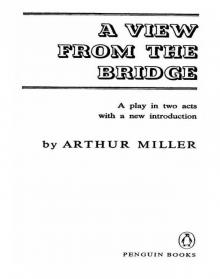 A View From the Bridge: A Play in Two Acts
A View From the Bridge: A Play in Two Acts Broken Glass
Broken Glass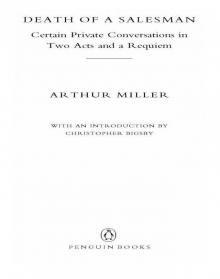 Death of a Salesman
Death of a Salesman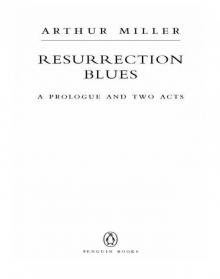 Resurrection Blues
Resurrection Blues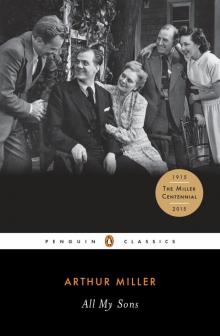 All My Sons
All My Sons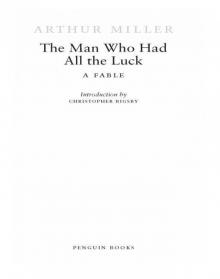 The Man Who Had All the Luck
The Man Who Had All the Luck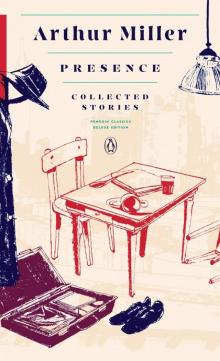 Presence: Stories
Presence: Stories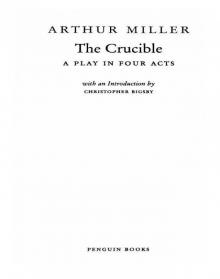 The Crucible
The Crucible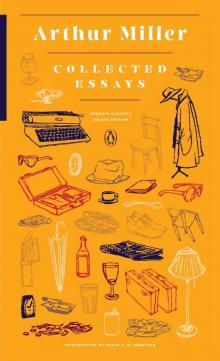 Collected Essays
Collected Essays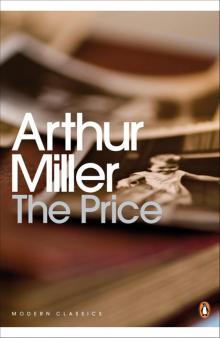 The Price
The Price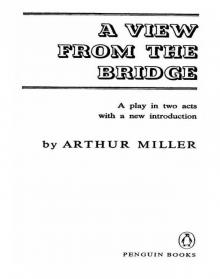 A View from the Bridge
A View from the Bridge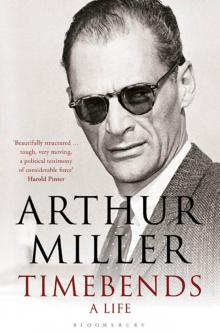 Timebends
Timebends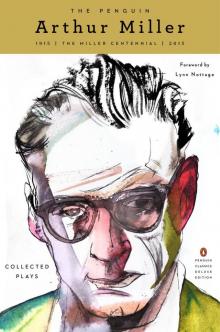 The Penguin Arthur Miller
The Penguin Arthur Miller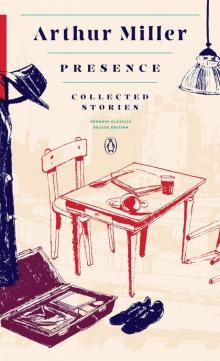 Presence
Presence